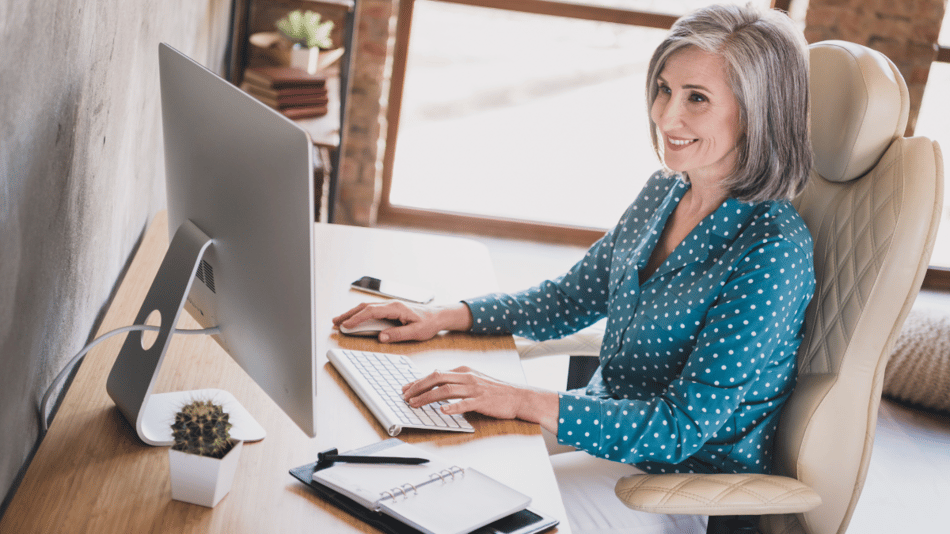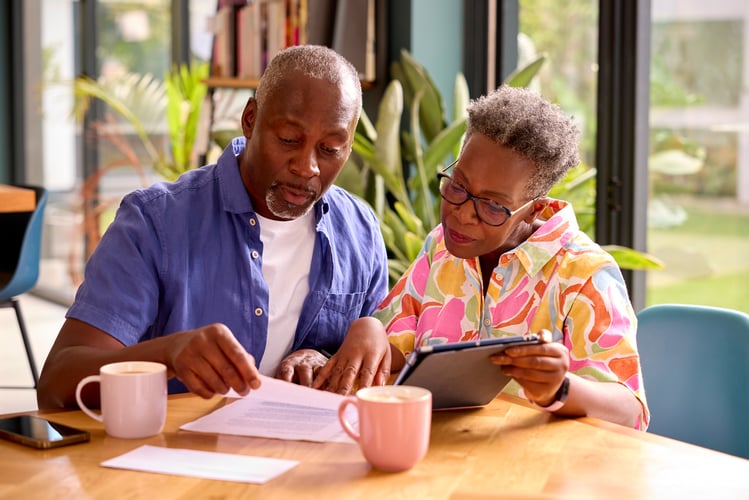Creating a Safe, Secure, and Efficient Home Office


As we celebrate Home Office Safety and Security Week (January 12-18, 2025), it’s the perfect time to focus on creating a safe, secure, and efficient home office—especially for those who are newly retired or preparing for retirement. Whether you’re spending your newfound free time working on hobbies, managing finances, or simply staying connected with friends and family, maintaining a safe and secure space is key to enjoying your retirement years without stress or worry.
Here are some essential tips to help you ensure that your home office is both functional and secure as you step into or plan for retirement:
1. Set Up an Ergonomic Workspace
As you spend more time in your home office, whether for personal projects or keeping up with finances, having an ergonomic setup is critical for your health. Retirement doesn’t mean you stop caring for your well-being, and a well-designed workspace can help you avoid strain or injury.
- Chair: Choose a chair that supports your lower back and promotes good posture.
- Desk Height: Your desk should be at a height that allows you to work comfortably without slouching or straining your arms.
- Monitor Position: Keep your monitor at eye level to avoid neck strain. A screen that is too high or too low can cause discomfort over time.
Setting up an ergonomic workspace will not only make your home office more comfortable but will also help prevent physical discomfort, allowing you to focus on what matters most during retirement.
2. Organize Important Documents and Secure Your Financial Information
Retirement often involves managing pensions, investments, healthcare plans, and estate planning documents. Keeping these records organized and secure should be a top priority. Here’s how:
- Physical Security: Store important documents in a safe or fireproof filing cabinet to protect against theft, damage, or natural disasters.
- Digital Security: Consider scanning and storing important documents digitally using encrypted storage services to reduce the risk of loss. Cloud storage providers such as Google Drive, Dropbox, or iCloud offer secure options for storing financial records, medical information, and personal documents.
In addition to documents, consider creating a digital inventory of important accounts (banking, insurance, etc.) and share it with a trusted family member or advisor for future reference.
3. Secure Your Devices and Accounts
With most retirees managing their finances and staying connected online, it’s crucial to ensure that all your devices—laptops, tablets, and smartphones—are secure. Cybersecurity threats are on the rise, and taking simple steps can help protect your personal and financial information.
- Use Strong Passwords: Always use strong, unique passwords for every account. Consider a password manager to keep track of them.
- Enable Two-Factor Authentication (2FA): This extra layer of security can help prevent unauthorized access to your accounts, especially your banking or investment accounts.
- Regular Software Updates: Keep your devices and apps up to date. Updates often include important security patches that protect against new threats.
Taking these steps will ensure that your devices and online accounts are better protected against fraud and identity theft.
4. Stay Cyber-Secure and Recognize Scams
As more activities move online, it’s important to be vigilant about potential cyber threats. Scammers often target retirees, hoping they are less familiar with the latest online security practices. Here are a few tips to stay safe:
- Phishing Scams: Be cautious of emails or messages asking for personal information, especially if they seem urgent. Always double-check the sender's address and avoid clicking on suspicious links.
- Verify Requests: If you receive a suspicious phone call, email, or message claiming to be from a bank or other trusted organization, verify it directly with the company before taking any action.
Consider installing reputable antivirus software and enabling firewalls to further protect your devices from malicious attacks.
5. Create a Backup Plan for Your Files and Memories
Backing up your important files and photos is essential for preserving your memories and financial data. Losing files can be devastating, especially if they contain essential documents or irreplaceable photos of family milestones.
- Cloud Services: Consider using cloud storage services like Google Drive, Dropbox, or iCloud to back up your documents automatically.
- External Hard Drives: An external hard drive is a great option for keeping backups of your most important files and photos.
- Regular Backups: Set reminders to back up your files monthly or quarterly to ensure that you have an up-to-date copy of everything important.
By creating a backup plan, you’ll ensure that your information is safe, even in the event of device failure or a cyberattack.
6. Prevent Home Accidents and Create a Safe Environment
Finally, it's important to make sure your physical workspace is free from hazards that could cause accidents or injuries. After all, retirement is about enjoying your time, not dealing with preventable accidents.
- Fire Safety: Ensure that smoke detectors are working, and consider having a fire extinguisher nearby. Keep electrical cords organized and away from heat sources to avoid fire hazards.
- Lighting: Make sure your workspace is well-lit to avoid straining your eyes, especially if you’re working late into the evening.
- Clutter-Free Desk: Keep your workspace tidy to prevent trips or falls. A cluttered desk can quickly lead to accidents.
Enjoy a Safe and Secure Retirement
Whether you're settling into retirement or preparing for it, having a secure and comfortable home office is key to enjoying this exciting phase of life. By implementing these safety and security tips, you’ll not only ensure that your home office remains productive but also safeguard your personal information, health, and peace of mind.
Take action this Home Office Safety and Security Week to set up a space that you can feel confident and comfortable in. After all, your retirement years are meant to be stress-free, enjoyable, and full of new possibilities!




